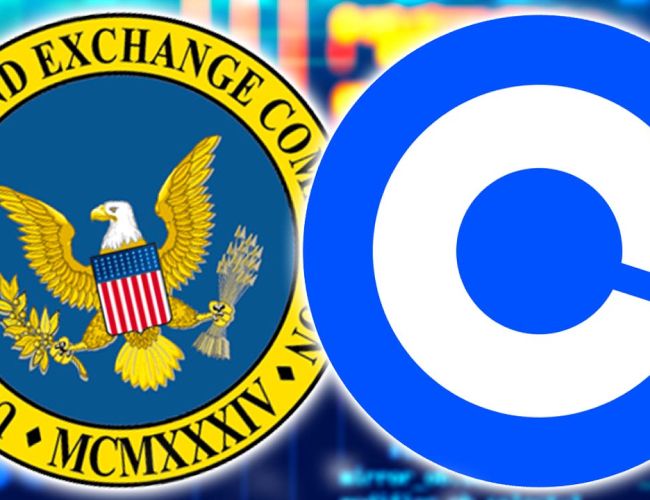Coinbase, the largest cryptocurrency exchange in the United States, is pressing for transparency as it battles the U.S. Securities and Exchange Commission (SEC) in court. The SEC has resisted Coinbase’s expansive subpoena requests, which demand access to “all documents that in any way relate to crypto assets.” This ongoing legal struggle underscores the growing tension between regulatory authorities and the rapidly evolving cryptocurrency industry.
Recent court filings reveal the SEC’s objections to Coinbase’s attempt to obtain internal communications, including emails related to cryptocurrency from SEC Chair Gary Gensler. The SEC has accused Coinbase of operating as an unregistered broker, exchange, and clearing agency, and claims that the exchange’s staking programs violate securities laws.
In response to the legal battle, the SEC asserts that it has already provided 240,000 documents and is in the process of reviewing an additional 117,000 for relevant information. Despite this, Coinbase insists that critical emails and other documents from non-enforcement staff are vital for its defense, particularly concerning fair notice.
Update: Today @SECGov filed its response to our request to produce important documents showing the record of the SEC’s inconsistent views of digital assets and its own regulatory reach. If the SEC is going to engage in an unprecedented regulation by enforcement campaign, the… https://t.co/MxQ1omDGN3
— paulgrewal.eth (@iampaulgrewal) August 5, 2024
Coinbase’s Call for Regulatory Clarity
Paul Grewal, Coinbase’s Chief Legal Officer, strongly criticized the SEC’s stance, arguing that the commission’s inconsistent views on digital assets and its regulatory jurisdiction are concerning. Grewal emphasized that if the SEC intends to proceed with what he describes as an unprecedented regulation-by-enforcement campaign, the least the agency owes the public is transparency. Coinbase has urged the court to compel the SEC to disclose key documents during the discovery process. The exchange is particularly interested in documents related to the tokens mentioned in the SEC’s complaint, the commission’s evaluation of Coinbase’s public offering, and statements made by Gensler during his tenure.
In April, Coinbase initiated its request for documents from the SEC, later expanding this request to include Gary Gensler’s crypto-related communications during his time as SEC Chair and even four years prior. The exchange also sought records from the Massachusetts Institute of Technology (MIT), where Gensler previously taught blockchain technology. However, Coinbase recently informed the court that it would no longer pursue documents unrelated to Gensler’s role at the SEC.
The SEC has countered by arguing that the documents sought by Coinbase are irrelevant to the claims against the exchange. Additionally, the SEC noted that Coinbase’s demands include documents from 17 additional custodians, requiring extensive new searches.
Paul Grewal has also weighed in on the issue of seized cryptocurrency assets, clarifying that these assets are not Congressionally appropriated funds. He pointed out that there is nothing new in the Federal Election Commission (FEC) complaint, which was filed by a self-described crypto critic and Public Citizen’s research director. Grewal noted that despite the complaint’s lack of novelty, it highlights the low threshold required to file such complaints. Furthermore, he mentioned that Coinbase continues to collaborate closely with federal law enforcement agencies and remains committed to its role in supporting the Marshals Service’s cryptocurrency needs, funded by the sale of assets forfeited to the Department of Justice’s Assets Forfeiture Fund.
Grewal also addressed concerns about Coinbase’s political contributions, stating that the exchange has donated equally to both Democratic and Republican super PACs, with $500,000 allocated to House and Senate funds for each party in preparation for the 2024 elections. This disclosure comes as the legal battle between Coinbase and the SEC intensifies, with the outcome likely to have significant implications for the broader cryptocurrency industry.
Coinbase’s Legal Wrangles
However, the recent case is only a tip of the iceberg on the firm’s legal disputes. Crypto exchange Coinbase (COIN) sued U.S. financial regulators, saying they failed to disclose information about past investigations into the cryptocurrency market and attempted to block the crypto industry from access to banking services.
Coinbase, partnering with consultancy firm History Associates Inc., filed lawsuits a month ago in the U.S. District Court for the District of Columbia against the Securities and Exchange Commission (SEC) and the Federal Deposit Insurance Corp. (FDIC), also accusing the agencies of withholding crucial information and not responding to Coinbase’s Freedom of Information Act (FOIA) requests.12
The complaints allege that regulators, including the SEC, FDIC, and the Federal Reserve Board, have used various tools to stifle the digital-asset industry for nearly two years. The unanswered FOIA requests sought information on the SEC’s view of Ethereum’s transition to a proof-of-stake consensus mechanism, as well as details from closed investigations into individuals and entities associated with the crypto market, according to the complaints.
The SEC’s denials of these documents, which have been refused citing potential harm to active enforcement proceedings, have been criticized by Coinbase as obstructive and contrary to FOIA’s intent.
Coinbase’s complaint against the FDIC also addresses “pause letters” sent to financial institutions the FDIC supervises, which allegedly aimed to halt crypto-related activities, framing the letters as part of a broader scheme to isolate digital-asset firms from banking services. While the SEC has taken several actions against the crypto industry over the past couple of years, there have been recent signs of a less-antagonistic approach.
 cryptonews.net
cryptonews.net
